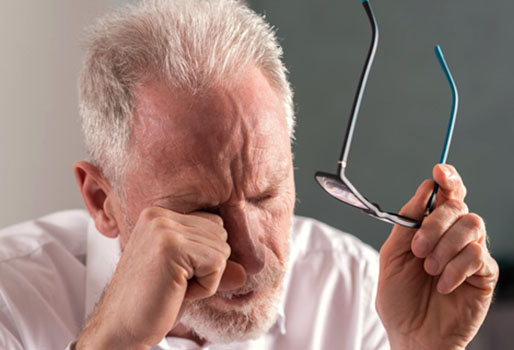Cancer Therapy May Drain Cellular Batteries
Decreased Energy Production Could Contribute to Cancer-Related Fatigue

The combination of hormonal therapy and radiation treatment leaves many cancer patients feeling extremely fatigued. IRP researchers have linked this phenomenon to reduced energy production in the mitochondria that power our cells.
We all know the feeling of being wiped out after a hard workout or a grueling day at the office — you just want to flop down on the couch and not move, or even think. For many cancer patients, the treatment for their disease can trigger that sort of physical and mental exhaustion for weeks or months. New IRP research has found evidence linking this phenomenon, known as cancer-related fatigue, to a slow-down in cells’ energy-producing mitochondria.1
‘Fatigued’ is commonly used as a synonym for ‘tired,’ but in the medical realm, the two are not the same. The feelings of lethargy associated with clinical fatigue do not improve with sleep or rest, instead persisting indefinitely and significantly reducing patients’ quality of life.
Cancer patients are particularly prone to fatigue because it is a common side effect of cancer treatment. While there are guidelines for managing this ‘cancer-related fatigue’ with medications and non-pharmacological approaches like exercise,2 the mystery behind what causes it limits the ability of doctors to help their chronically exhausted patients.
“The challenge with these recommendations is that there’s not really a whole lot of evidence about how the various therapeutic approaches work or how well they work,” says IRP investigator Leorey N. Saligan, Ph.D., R.N., the new study’s senior author. “The science behind the guidelines still needs to be strengthened.”
There are several theories concerning why cancer treatment causes fatigue, including increased bodily inflammation and a reduction in red blood cells, known as anemia. However, while these processes may indeed play a role in cancer-related fatigue, Dr. Saligan wondered whether problems with the mitochondria that power our cells might also contribute.
Dr. Saligan’s new study focused on men with prostate cancer that had not spread to other organs. The standard treatment for such patients is a combination of radiation and a therapy known as androgen deprivation therapy (ADT), which hinders the cancer’s growth and makes it more sensitive to radiation treatment by decreasing levels of certain hormones, including testosterone. As expected, Dr. Saligan’s team found that patients who received both radiation treatment and ADT experienced worse fatigue symptoms and had worse anemia than patients who were only treated with radiation. Because fatigue can be a result of depression, the researchers also examined changes in depression symptoms and ultimately found that they did not differ between the two groups.

Dr. Leorey Saligan (left) discusses an experiment with a member of his research team.
While it’s possible that the more severe anemia in the combination therapy group could explain their greater feelings of fatigue, Dr. Saligan’s study suggests this might not be the full story. When the researchers took blood samples from the patients and examined a measure of mitochondrial function in their white blood cells, they found that patients who experienced clinically significant fatigue during the course of their treatment had lower mitochondrial function than patients who were not fatigued
Next, to explore the role that mitochondria in the brain might play in cancer-related fatigue, Dr. Saligan’s team gave mice an ADT-like treatment, radiation treatment, or both. The animals exposed to both radiation and ADT ran substantially less on their wheels in the three days after receiving radiation than the three days beforehand, suggesting they were experiencing something akin to human cancer patients’ fatigue. Mice that only received ADT did not show this change in activity. In addition, radiation treatment decreased the levels of two markers of mitochondrial health in the animals’ brains, bolstering the theory that cancer-related fatigue may stem in part from malfunctioning mitochondria in the brain.
“Fatigue has so many dimensions,” Dr. Saligan says. “It’s not only physical exhaustion, but patients also complain that they can’t think well. They call it ‘brain fog’ sometimes.”
Moving forward, Dr. Saligan’s team will attempt to replicate its findings in patients receiving treatment for other types of cancer. In addition, the researchers are currently collaborating with another IRP lab to see how exercise affects fatigue symptoms and mitochondrial function in the blood cells of patients with lupus, an autoimmune disease. At the same time, they are examining receptors for a chemical called dopamine in the brain to see how their activity might relate to fatigue.
“Those studies are really critical in not only understanding the biology but also looking at possible therapeutic targets to help patients with fatigue,” Dr. Saligan says. “It’s a fascinating idea that systems both inside and outside the brain could play a role.”
Subscribe to our weekly newsletter to stay up-to-date on the latest breakthroughs in the NIH Intramural Research Program.
References:
[1] Cancer-related fatigue during combined treatment of androgen deprivation therapy and radiotherapy is associated with mitochondrial dysfunction. Feng LR, Wolff BS, Liwang J, Regan JM, Alshawi S, Raheem S, Saligan LN. Int J Mol Med. 2020 Feb;45(2):485-496. doi: 10.3892/ijmm.2019.4435.
[2] Cancer-Related Fatigue, Version 2.2015. Berger AM, Mooney K, Alvarez-Perez A, Breitbart WS, Carpenter KM, Cella D, Cleeland C, Dotan E, Eisenberger MA, Escalante CP, Jacobsen PB, Jankowski C, LeBlanc T, Ligibel JA, Loggers ET, Mandrell B, Murphy BA, Palesh O, Pirl WF, Plaxe SC, Riba MB, Rugo HS, Salvador C, Wagner LI, Wagner-Johnston ND, Zachariah FJ, Bergman MA, Smith C; National comprehensive cancer network. J Natl Compr Canc Netw. 2015 Aug;13(8):1012-39.
Related Blog Posts
This page was last updated on Tuesday, May 23, 2023
